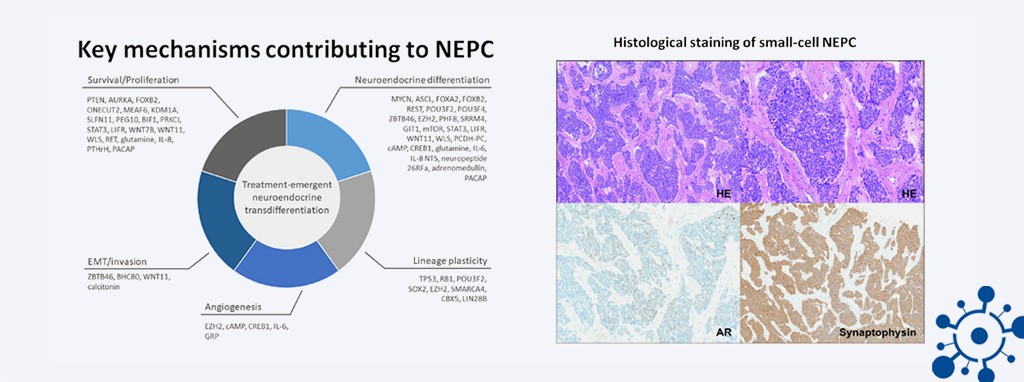P16 - Liquid biopsy approaches to determine tumor cell heterogeneity in advanced prostate cancer: development of resistance, trans- and dedifferentiation
Gunhild von Amsberg, Klaus Pantel & Stefan Werner
Institute for Tumorbiology, University Medical Center Hamburg-Eppendorf
;
Department of Internal Medicine II (Oncology Center), University Medical Center Hamburg-Eppendorf
;
Martini-Klinik at the University Medical Center Hamburg-Eppendorf
Therapy of hormone-driven prostate cancer has improved in recent years due to the development of new drugs. However, the selective pressure on these tumors frequently rises therapy resistant cell clones and an increasing number of tumors growing independently of the androgen-receptor signaling pathway is observed. These aggressive variants of prostate cancer (AVPC) are characterized by a more rapid disease progression and unusual sites of metastasis, such as liver or brain. A subset of AVPC also shows traits of neuroendocrine transdifferentiation. AVPC barely produce prostate specific antigen, routinely used for prostate cancer monitoring. Therefore, early recognition of the growth of AVPC remains challenging.
Origin of therapy-induced Neuroendocrine prostate cancer (t-NEPC). Two opposing theories have been proposed to explain the origin of t-NEPC: Clonal expansion – the outgrowth of neuroendocrine or NE-differentiated basal cells – and transdifferentiation of adenocarcinoma cells (Merkens et al.) Liquid biopsy approaches utilize tumor cells and tumor cell products such as tumor-derived nucleic acids present in body fluids. For instance, the analysis of circulating tumor cells and cell-free tumor DNA in blood gives insight into the genomic aberrations of the tumor tissue. Additionally, compared to tissue biopsies, liquid biopsies are more suitable to assess tumor heterogeneity and to continuously analyze the course of disease by sequential analyses. The aim of this project is to identify novel blood-based biomarkers for diagnosis of AVPC. For this purpose, circulating tumor cells are analyzed by CellSearch and by targeted gene expression analysis of neuroendocrine genes. In a complementary approach, cell-free DNA is isolated from blood plasma of the same set of patients. Subsequently, the presence of genomic aberrations in central tumor suppressor genes is determined by targeted next-generation sequencing approaches. Establishment of biomarkers for AVPC will be the basis for further clinical trials and improvement of therapy for patients suffering from this disease.
This project is part of the interdisciplinary graduate school Innovative Technologies in Cancer Diagnostics and Therapy at the UCCH, which is supported by the City of Hamburg. In addition, the project is supported by Erich und Gertrud Roggenbuck-Stiftung
Grants: Hansestadt Hamburg , Erich und Gertrud Roggenbuck Stiftung
Contact: g.von-amsberg@uke.de ; st.werner@uke.de
-
Selected publications on topic
Aggressive variants of prostate cancer: underlying mechanisms of neuroendocrine transdifferentiation. Merkens L, Sailer V, Lessel D, Janzen E, Greimeier S, Kirfel J, Perner S, Pantel K, Werner S, von Amsberg G.J Exp Clin Cancer Res. 2022 Feb 2;41(1):46. doi: 10.1186/s13046-022-02255-y.PMID: 35109899
Expression Patterns and Corepressor Function of Retinoic Acid-induced 2 in Prostate Cancer. Besler K, Węglarz A, Keller L, von Amsberg G, Bednarz-Knoll N, Offermann A, Stoupiec S, Eltze E, Semjonow A, Boettcher L, Schneegans S, Perner S, Hauch S, Todenhöfer T, Peine S, Pantel K, Wikman H, Werner S.Clin Chem. 2022 Jul 3;68(7):973-983. doi: 10.1093/clinchem/hvac073.PMID: 35652463
Liquid Biopsy: From Discovery to Clinical Application. Alix-Panabières C, Pantel K.Cancer Discov. 2021 Apr;11(4):858-873. doi: 10.1158/2159-8290.CD-20-1311.PMID: 33811121



